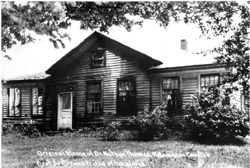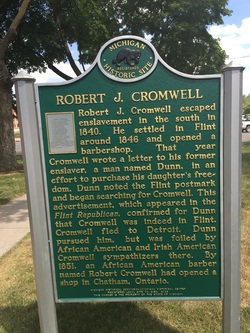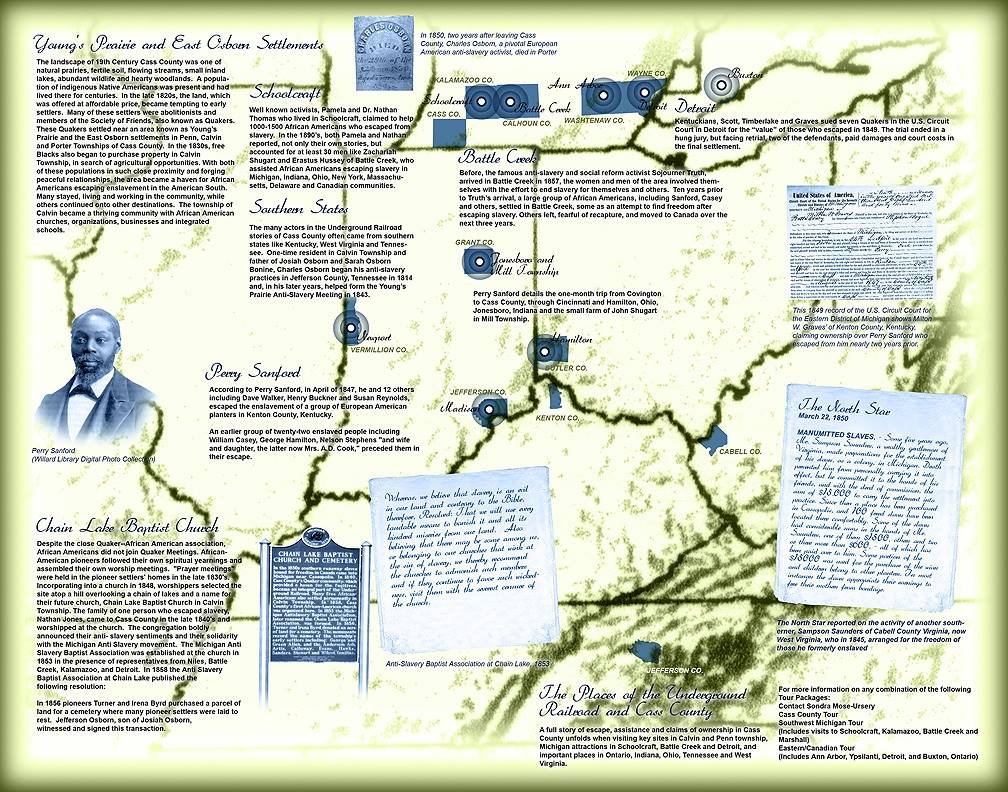INSTITUTE OF PUBLIC SCHOLARSHIP
FREEDOM TRAIL COORDINATOR
During her work as the Freedom Trail coordinator for the State of Michigan from 2002 - 2008, Johnson solidified her public scholarship and leadership and expanded her contribution to assist professional and lay-historians in the preservation, documentation and promotion of Underground Railroad histories. In that position, she oversaw the development of a broad-based archival based curriculum for 3rd, 4th and 8th grade students and served as a visible state and regional spokesperson. Facilitate dialogue, planning and implementation of the documentation, preservation, exhibition and promotion of research, education, preservation and cultural tourism regarding Slavery, Resistance to and Underground Railroad in Michigan.
pulses of the underground railroad: map text, context and primary and secondary sources by michelle s. johnson
Historic Register Submissions
national parks service marker
 1910 postcard of the Thomas House
1910 postcard of the Thomas House
Nathan Thomas House
National Parks Service
613 East Cass Street
Schoolcraft, Michigan
Cass County
The Dr. Nathan Thomas House, built in 1835, was the home of one of Michigan's most active Underground Railroad participants, a founding member of the state's Republican Party and Kalamazoo County's first physician. Born in Mt. Pleasant, Ohio, a Quaker town well-known for the antislavery activities of its residents, Dr. Nathan Thomas (1803-1887) settled in Schoolcraft around 1833. In 1835, he constructed a building that served as both an office and residence. Five years later he enlarged the house when he married Pamela Brown of nearby Prairie Ronde township. Pamela Brown Thomas' memoirs, written in 1892, provide much information on her and her husband's Underground Railroad activities. Referring to Dr. Thomas' early days in Schoolcraft, before their marriage and the construction of his office and residence in 1835, Mrs. Thomas wrote, "His antislavery views were so well known, that, while he was a bachelor boarding at the hotel, fugitives from slavery had called on him for assistance and protection." Pamela Brown Thomas estimated that between 1840 and 1860 she and her husband helped between 1,000 to 1,500 fugitive slaves escape into freedom. By the mid-1840s, a group of abolitionists in southwest Michigan had created an organized system for transporting fugitive slaves. Slaves were often brought to the Thomas House by Zachariah Shugart, a fellow Quaker living on Young's Prairie, Cass County. Dr. Thomas would then shuttle the runaways to Erastus Hussey, another fellow Quaker living in Battle Creek. The slaves would eventually make their way to Detroit and onto freedom in Canada. The first physician in Kalamazoo County, Dr. Thomas not only practiced medicine but also became involved in state politics. In 1837, he was one of 400 residents in Prairie Ronde and Brady (now Schoolcraft) townships who petitioned Congress in opposition to the annexation of Texas because of the territory's support of slavery. Two years later, he joined others in founding a Michigan newspaper devoted to the antislavery cause and in 1845 ran unsuccessfully as Lt. Governor on the abolitionist Liberty Party ticket. A key participant in an 1854 antislavery convention in Jackson, Michigan, Dr. Thomas was a nominating committee member of the newly-formed Michigan Republican party. The party ticket triumphed that year, beginning a period of Republican domination of the state government.The Dr. Nathan Thomas House is located at 613 East Cass Street in Schoolcraft, Michigan.
michigan freedom trail markers
|
Second Baptist Church Michigan Freedom Trail 441 Monroe Street Detroit, Michigan 48226 Wayne County Submitted by Michelle S. Johnson The current site of Second Baptist Church on Monroe in Detroit stands as a testimony to the mission to ensure the freedom of the enslaved and "have them enjoy the full privileges of American citizenship." Between 1836 and 1865, the church now known as Second Baptist Church, changed names, locations, leadership and congregations while members and guests maintained a significant anti-slavery and civil rights activism. Fort Street Baptist Church, later named Second Baptist, provided leadership in matters spiritual and political and remained active in the anti-slavery cause with other Baptists, across denominations and throughout state and geographical regions, as African Americans across the growing nation used the press to forward black newspapers. The pastor and congregation persisted in their strategy of bringing "colored" men from across the state in 1843 to mobilize around the key issues. The community hosted notable figures such as Henry Highland Garnet, Frances Ellen Watkins, Frederick Douglass and Charles Lenox Redmond. The activism that permeated the leadership and setting before Abraham Lincoln's Emancipation Proclamation continued after the Civil War. MARKER TEXT WRITTEN BY JOHNSON Founded in 1836 by thirteen former slaves, this is the oldest black congregation in Michigan. From it beginnings the church has occupied a prominent place in Detroit's black community. In 1839 it established the city's first school for black children, and its first pastor, the Reverend William C. Monroe, was a noted anti-slavery activist. In 1843 he presided over the first State Convention of Colored Citizens, which met at the Second Baptist Church. Delegates demanded the right to vote and an end to slavery. On January 6, 1863, Detroit's blacks celebrated the Emancipation Proclamation here. Located at this site since 1857, the church has expanded its facilities through the years. Registered Site L0346 Erected 1975 Location: 441 Monroe Detroit, Wayne County |
George DeBaptiste Homesite
Michigan Freedom Trail George DeBaptiste Homesite 441 E. Jefferson Detroit, Michigan 48226 Wayne County Submitted by Michelle S. Johnson This marker and former homesite commemorates George DeBaptiste, a freeborn African American, who made substantial and well-documented contributions to the Underground Railroad and antislavery efforts in Kentucky, Indiana and Michigan. As early as 1837, DeBaptiste challenged state and federal laws and the racism of Southern slaveholders and northern whites, to ensure the freedom and dignity of all African Americans. DeBaptiste's actions were documented in antislavery newspapers such as the Signal of Libery, theProvincial Freeman and the Detroit Daily Advertiser and Tribune, and by Levi Coffin. His close affiliation with Coffin, John Brown, William Lambert, Henry Bibb and Martin R. Delany and others; his membership in the Colored Citizens of Detroit, the Refugees Home Society and Second Baptist Church in Detroit; and his aid to those escaping enslavement on the Underground Railroad, illustrate his status as an integral strand, strengthening the fabric of the national attempt in the 19th century to ensure the abolition of slavery in the Midwest and across the country. MARKER TEXT George DeBaptiste, a long-time Mason, and one of Detroit's most active and impassioned black community leaders, lived on this site during the 1850s and 60s. Born in Virginia about 1815, he moved to Madison, Indiana in 1838 and became involved in the Underground Railroad. Forced to leave because of his anti-slavery activities, DeBaptiste became the personal valet of General William Henry Harrison, whom he accompanied to the White House as a steward. In 1846, DeBaptiste came to Detroit and conducted several successful businesses. At the same time he served as a delegate to the Cleveland National Convention of Colored Citizens, and as an agent for the Freedman's Aid Commission. During the Civil War, he served as an organizer of Michigan's Colored Regiment. DeBaptiste died in 1875. Registered Site S0452 Erected 1975 Location: East Larned and Beaubien Detroit, Wayne County |
 Robert Cromwell marker: Flint, MI
Robert Cromwell marker: Flint, MI
Robert J. Cromwell*
Michigan Freedom Trail
West Court Street
Flint, Michigan
Genessee County
*Johnson discovered the primary document that corroborated Cromwell's time in Flint, provided other historical documentation and reviewed the text.
During the mid-nineteenth century a small number of African Americans settled in Genesee County where they found cheap land and employment as barbers, laborers, farmers, carpenters, and domestics. At this time differing opinions in Genesee County reflected growing tensions nationally. The Genesee Weekly Democrat ran articles unsympathetic to Blacks, but also printed editorials opposing slavery. The Genesee Whig promoted abolition. In 1841 residents formed the Genesee County Anti-Slavery Society and held meetings at the courthouse, which became a venue for national figures who lectured about the evils of slavery. Author, publisher and activist who escaped slavery, Henry W. Bibb, and Liberty Party presidential candidate James G. Birney spoke here among other notable lecturers.
MARKER TEXT
Robert J. Cromwell escaped enslavement in the South in 1840.He settled in Flint around 1846 and opened a barbershop. That year Cromwell wrote a letter to his former enslaver, a man named Dunn, in an effort to purchase his daughter's freedom. Dunn noted the Flint postmark and began searching for Cromwell. This advertisement, which appeared in the Flint Republican, confirmed for Dunn that Cromwell was indeed in Flint. Cromwell fled to Detroit. Dunn pursued him, but was foiled by African American and Irish American Cromwell sympathizers there. By 1851, an African American barber named Robert Cromwell had opened a shop in Chatham, Ontario.
Registered Site L2150
Erected 2005
Location: 920 South Saginaw
Flint, Genesee County
Michigan Freedom Trail
West Court Street
Flint, Michigan
Genessee County
*Johnson discovered the primary document that corroborated Cromwell's time in Flint, provided other historical documentation and reviewed the text.
During the mid-nineteenth century a small number of African Americans settled in Genesee County where they found cheap land and employment as barbers, laborers, farmers, carpenters, and domestics. At this time differing opinions in Genesee County reflected growing tensions nationally. The Genesee Weekly Democrat ran articles unsympathetic to Blacks, but also printed editorials opposing slavery. The Genesee Whig promoted abolition. In 1841 residents formed the Genesee County Anti-Slavery Society and held meetings at the courthouse, which became a venue for national figures who lectured about the evils of slavery. Author, publisher and activist who escaped slavery, Henry W. Bibb, and Liberty Party presidential candidate James G. Birney spoke here among other notable lecturers.
MARKER TEXT
Robert J. Cromwell escaped enslavement in the South in 1840.He settled in Flint around 1846 and opened a barbershop. That year Cromwell wrote a letter to his former enslaver, a man named Dunn, in an effort to purchase his daughter's freedom. Dunn noted the Flint postmark and began searching for Cromwell. This advertisement, which appeared in the Flint Republican, confirmed for Dunn that Cromwell was indeed in Flint. Cromwell fled to Detroit. Dunn pursued him, but was foiled by African American and Irish American Cromwell sympathizers there. By 1851, an African American barber named Robert Cromwell had opened a shop in Chatham, Ontario.
Registered Site L2150
Erected 2005
Location: 920 South Saginaw
Flint, Genesee County
ARCHAEOLOGICAL PROJECTS
YOUNG'S PRARIE/RAMPTOWN CASS COUNTY, MI ARCHAEOLOGY PROJECT

Tiling Up Fragments of History
Christine Schwerin, Michigan History Magazine
Spring has come to rural Michigan, and farmers are tilling their fields. Occasionally, these farmers come across fragments of history. Over the course of many decades, a few farmers in Vandalia (Cass County) noticed an abundance of logs, dishes, bricks and glass. Historian Sondra Mose-Ursery had heard stories about a runaway slave community that purportedly existed in Vandalia in the early to mid 1800s. Could these bits and pieces be the remains of that community?
Christine Schwerin, Michigan History Magazine
Spring has come to rural Michigan, and farmers are tilling their fields. Occasionally, these farmers come across fragments of history. Over the course of many decades, a few farmers in Vandalia (Cass County) noticed an abundance of logs, dishes, bricks and glass. Historian Sondra Mose-Ursery had heard stories about a runaway slave community that purportedly existed in Vandalia in the early to mid 1800s. Could these bits and pieces be the remains of that community?

